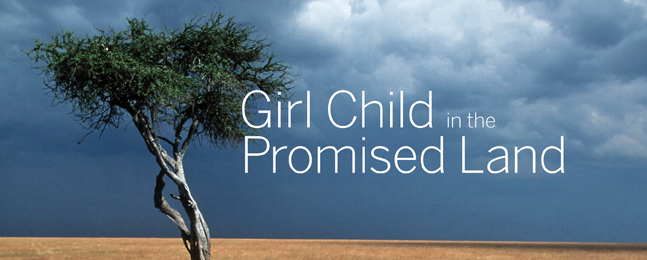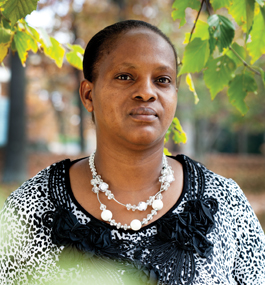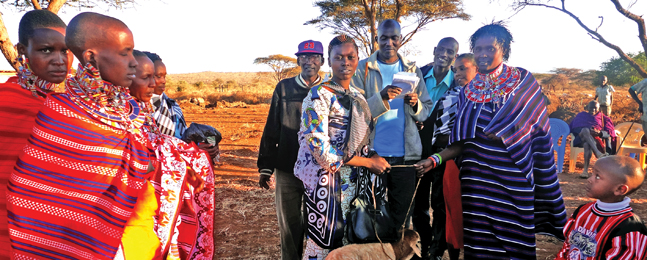Girl Child in the Promised Land
Grace Majiakusi, Heller MA’13, has walked a long road to convince her Maasai village to value its women as much as its men.

Getty Images
by Susan Piland
Thirty-two years ago, in a remote Maasai village in southern Kenya, just north of Tanzania and Mount Kilimanjaro, an unusual girl was born.
Grace Majiakusi is the second child — the first daughter — of a cattle herder and his first wife. Grace’s father married a total of six wives, who bore him 31 children. Nothing out of the ordinary there; polygamy is common among the Maasai.
The little girl grew up near Amboseli National Park, a game reserve filled with African elephants, giraffes and wildebeests, which draws wealthy tourists from all over the world. Her village had no electricity. The roads that led to the village were so rough they couldn’t be traversed by car, only by motorbike.
Houses were simple, constructed from wooden poles plastered with mud and cow dung to keep out the elements. Majiakusi’s mother and the other village women built the homes, a custom born of the Maasai’s semi-nomadic lifestyle.
Yet the women were forbidden from owning a house, or a cow, or any other form of property. They were barely given any schooling. What did education matter? In the Maasai culture, a woman had one goal: to become a very young wife to a man willing to pay a large dowry to her family.
Centuries of conventions and beliefs promised to send Majiakusi down the very same path, into a life of hard physical labor and privation.
But something happened. Somehow Majiakusi became the first girl from her village to go to college. And today, more than 7,000 miles away from where she grew up, she is finishing the final year of a master’s degree in sustainable international development at the Heller School.
When she gets her degree, she will return to Kenya to resume the work of an initiative she co-founded a few years ago, the Naretoi Girl Child Project, which seeks to convince Maasai parents to place as much value in their daughters as they do in their sons.
“I come from far,” Majiakusi says today with a smile, in accented yet fluent English.
Even she’s a little amazed at the trails she’s been able to blaze. “I went through so many challenges,” she says. “I think it’s God that got me to where I am. That’s why I have a passion for helping other women, and for the girl child and children in general. I feel like, since I got this opportunity to come this far, I owe them something.
“I don’t want someone to have to go through what I went through.”

Photo by Jörg Meyer
Majiakusi on the Brandeis campus in October.
page 2 of 5
Cows for College
Like other girls her age in her village, Majiakusi had to drop out of school in the sixth grade to prepare for marriage.
The girls who got married never went back to school. Today, Majiakusi says, they are still “young, young ladies.” But they are also “old women with six children. They are married to men who have other wives. They can’t make decisions. They can’t do anything.”
For some reason — she still doesn’t know why — Majiakusi’s own betrothal fell apart. The man she was supposed to marry at age 12, a man she had never met, didn’t show up to claim her.
She waited nearly a year for the suitor who never came. Then she knew: She wanted to go back to school. She liked school. She was a hard-working girl who’d spent grades one through three taking lessons under a tree, because there was no schoolhouse then.
Majiakusi’s father ignored the wishes of the village elders and sent his daughter back to the sixth grade. She’s not sure why; perhaps he responded to some sense of purpose he saw in her. After she finished eighth grade, the end of primary school in Kenya, her father started selling his livestock, one by one, to pay for four years of secondary education.
“It became a laughing matter in the village,” Majiakusi says, “because why sell your cows just because of a girl?”
Going on to attend a university would be an unimaginable step. No young woman from her village had done that. Majiakusi applied to Daystar University, a Christian college in Nairobi (like many Maasai, Majiakusi and her family are practicing Christians). She was accepted. And she enrolled.
“It was a private university, so it was very expensive,” she says. But her parents kept selling livestock, until all their cows were gone. She got student loans from the Kenyan government and took some work-study positions.
When she graduated from Daystar with a bachelor’s degree in integrated community development, no one in her village was laughing. In fact, the entire village piled into buses to attend her graduation ceremonies.
Majiakusi returned to the village. “I started giving back to the community,” she says. She partnered with two NGOs: World Vision Kenya, which works to improve children’s futures across a range of issues, and ChildFund Kenya.
She tackled big issues: She talked about the importance of gender mainstreaming in education, and — with the assistance of ChildFund Kenya — began to put together the Naretoi Girl Child Project. She developed strategies to help women empower themselves economically. She brought the pervasive problem of violence against women out into the open. She established women’s groups, giving women a safe place to talk about their hopes and fears.
“I did a lot of work,” she says. And she did it in the mud-daubed homes of the villagers, not from a Nairobi office building. “To make an impact, you have to go to the community, sit with the people and identify with them.”
The villagers saw how much Majiakusi was doing, including making sure her younger siblings were educated and repaying her parents by replacing the cows they had sold for her. The villagers actually began consulting with her parents, asking for advice on how to raise their own children.
In 2003, a law passed by the Kenyan government offered a major boost to Majiakusi’s push to educate girls by making primary-school education free for all children. Today, if authorities find children at home who are not in school, family members can be arrested.

Photo by Grace Majiakusi
This past summer, after Majiakusi helped to build a new home for her sister Jennifer (wearing purple, standing at right), the village brought sheep and other gifts to mark the occasion.
page 3 of 5
A Tragic Tradition
Eight years later, another Kenyan law had a major impact on Majiakusi’s work. Kenya became one of 22 African countries to outlaw female genital mutilation.
Also known as female circumcision, female genital mutilation is the practice of altering and injuring a young girl’s genital organs. The kind and degree of the injury varies across cultures and traditions, and can include either a partial or a total removal of the girl’s external genitalia. The World Health Organization estimates that as many as 92 million women and girls in Africa, age 10 and above, have undergone the practice, which is generally done with crude instruments, under unsterile conditions and without any anesthetic.
Majiakusi is one of these women. When she dropped out of the sixth grade to prepare for marriage, tradition demanded that she participate in her village’s circumcision “ceremony.”
“When I was growing up, 100 percent of girls had to go through that,” she says. “No one escaped. They do the circumcision when you’re young. You can’t fight. At the time they did it to me, I could not even understand what was going on.”
In hindsight, Majiakusi sees her circumcision as the event that decided her destiny, that turned her into an advocate for others, even if this advocacy meant bucking long-held social norms.
“I was, I think, 11 years old,” she says. “There were so many of us who were going through the ceremony. Everybody is celebrating, but you are suffering. Somebody cut your body for no reason. If you ask them, ‘Why do you circumcise girls?’ they just say, ‘It was done since time immemorial. Why can’t you go through it?’ That is the moment I say, no, this is not right. I have to make a change. This old tradition will have to stop.”
The Kenyan government’s 2011 decree against female genital mutilation has helped reduce the practice. But only incrementally — the pull of tradition is so strong.
“Now, maybe 80 percent of Maasai women go through circumcision,” Majiakusi says. “It’s done in a hidden way; they don’t do it openly. I’m hearing from my family that my sisters are not going to be circumcised. But I’m not there — I don’t know for sure.”
The tradition is stubbornly defended, Majiakusi says, particularly by women: “We did a survey about the whole issue. Men say they don’t have a problem going away from female circumcision, but women do.”
Education offers the best road away from female circumcision, Majiakusi believes. Women will begin to let themselves see how unnecessary and damaging it is, and mothers will refuse to hand their daughters over to such brutal treatment.
page 4 of 5
Learning by a Kerosene Lamp
The topic of education comes up frequently when Majiakusi talks about finding solutions to problems. She believes in it so strongly. And she had to work so hard to get hers.
As a child, she walked three kilometers, nearly two miles, to get to school. Coming home, she often walked after nightfall.
There and back, she was surrounded by hungry four-footed predators; neighboring Amboseli National Park isn’t fenced in. “You would meet wild animals along the way to school,” Majiakusi says. “There are lions and elephants and buffaloes. The animals go outside the park to look for food.” She and her schoolmates got used to the danger, she says, but they were always afraid.
When Majiakusi studied at home, there was no electricity. “Only a small tin lamp with kerosene,” she says. “That’s what you used to read. Sometimes there’s no kerosene, so you don’t do your homework.”
Years later, says Majiakusi, one of her undergraduate professors visited her village and couldn’t believe she had managed to get to college from that kind of early environment.
The Naretoi Girl Child Project tries to level the learning playing field for girls. As part of the initiative, Majiakusi has set up a boarding school that educates more than 400 young women in place.
“There was a lot of school dropout because the environment is really harsh for girls,” she says. “They would walk several kilometers to school and back. They would find animals along the way, and sometimes men who rape them. So we had to look for a conducive environment for them. Now they are really doing well.
“The challenge now,” she continues, “is that the girls are doing well, but the boys are not doing as well. We have to look for a way to balance.”
Persuading rural families to fully embrace the notion of educating girls remains a hurdle. “It’s not easy,” Majiakusi says. “It’s not easy.
“But now they are seeing the benefits,” she says. “I got an education, and my younger brother got an education at the same time. When I got married” — Majiakusi’s husband, whom she married for love, works with the United Nations World Food Programme — “I came back to my community. My brother got married and went to the city with his wife. So now they are starting to compare. Not only me — they are seeing so many girls coming back to help their communities.”
page 5 of 5
Toward a Sustainable Future
All the social advocacy work Majiakusi was doing at home attracted the attention of the Ford Foundation, which awarded her a fellowship that would allow her to earn an advanced degree at an international university.
Brandeis was already on her radar. One of her undergraduate professors was George Saitoti ’67, a respected Kenyan politician and economist, who was vocal in his praise of Brandeis, where he had been a Wien Scholar (in June, Saitoti, then Kenya’s internal security minister, was killed in a helicopter crash near Nairobi). As Majiakusi considered what school to attend, the Ford Foundation introduced her to more alumni from universities all over the world, including several graduates of the Heller School.
She quickly set her sights on Heller’s sustainable international development program. Its approach “blended so well” with her initiatives and her goals for expanding them, she says.
In 2011, she moved to Waltham, leaving her husband and their son, now 10, back in Kenya.
“The first year I was here — oh, my God — I knew I was about to learn a lot, a lot, a lot,” she says. “I felt like now I will be able to make a change. By the end of the year, I had answers I didn’t know before.”
The biggest question Majiakusi came with:
How could she ensure her development efforts have real durability?
She has learned, she says, that she has to consider the social, economic and environmental aspects of what she’s trying to accomplish. In her work at home, she realized, she had instinctively focused on “the social bit.” So “we were looking at education, and we forgot about the economic bit. And nobody was caring about the environment.
“But you have to look at the holistic picture,” she says. “The economic, the social and the environmental — they are three pillars together. There is such knowledge at the Heller School. Now the issue is to put it into action.”
As it happens, the pastoralist economy of the Maasai, who for generations have been cattle herders, is evolving into an agrarian economy out of environmental necessity: Climate change has reduced the availability of pasture and water.
“My parents and other Maasai people used to move as far as Tanzania and to the coast of Kenya,” says Majiakusi. “Now there is division of land, and people are settling down and don’t move with their livestock. Even if they move, they don’t move the long distances they used to.”
Fortunately, agriculture — aided by water that flows from Mount Kilimanjaro — offers a source of income that women can participate in.
“The women won’t have to rely on the men to sell livestock in the market to get food on the table,” Majiakusi says. “Women can grow and sell their own food crops. They can sell the milk they get from the cows. People didn’t know that they could sell the milk at the market. They’d just drink the milk, or even give it away. But now they know they can sell the milk to get some income, or grow maize, beans, tomatoes. Once women thought they’re just going to look after the livestock and wait for the husband to provide for the family. But now it’s changing.”
As women get more involved in agriculture, suddenly the Maasai community sees an even bigger benefit to educating them — education helps them become better earners.
“It’s like this whole shift,” Majiakusi says. “Now people are seeing the value of girls.”
When the earning power of women rises, domestic violence goes down. “We did some research and found that for women who wait for food to be brought to the table, there is a lot of abuse,” Majiakusi says. Women who are breadwinners, on the other hand, are less likely to be battered.
As she works toward her master’s at Heller, Majiakusi keeps her eye on what’s going on at home. Climate change is threatening the agrarian economy, so she’s arranging for civil engineers to come to her village to bore holes for wells. Last year, the Kenyan government built a tarmac road that links Majiakusi’s village to Tanzania, vastly improving transportation. And electricity is on its way: Majiakusi says she’s working on bringing solar power to the village (“It’s coming, very soon”).
When Majiakusi returns to Kenya full time, she’ll redouble her efforts to help people lead more fulfilling lives, she says. She’ll grow her Naretoi Girl Child Project, and continue to support the socioeconomic empowerment of women. She also hopes to influence government decisions. She’s considering teaching at a university. She dreams of getting a PhD.
“There is a lot of work waiting,” Majiakusi says. She knows she’s unusually well-positioned to make a difference in the lives of the members of her village. “I’m a role model. It’s easy for them to believe in me.
“When I came to Brandeis, they all took me to the airport,” she remembers. “Two buses filled with people. Everybody was fighting to come. When I graduate, I think they will all be waiting for me at the airport.
“I just hope when I go back I will make an impact, because I belong to the whole community. I owe them a lot.”
